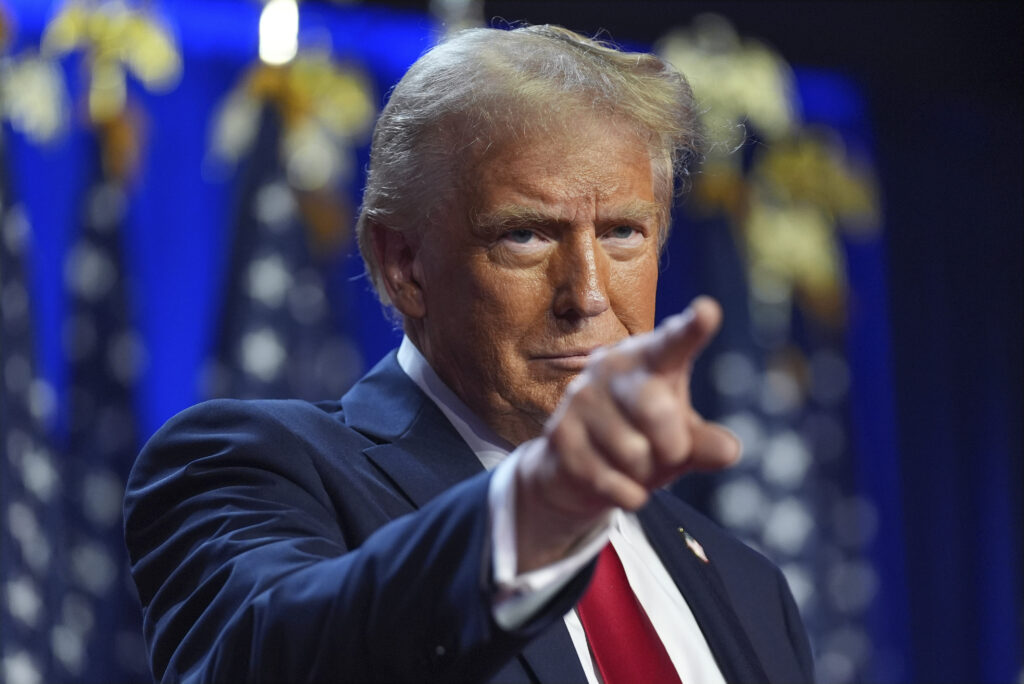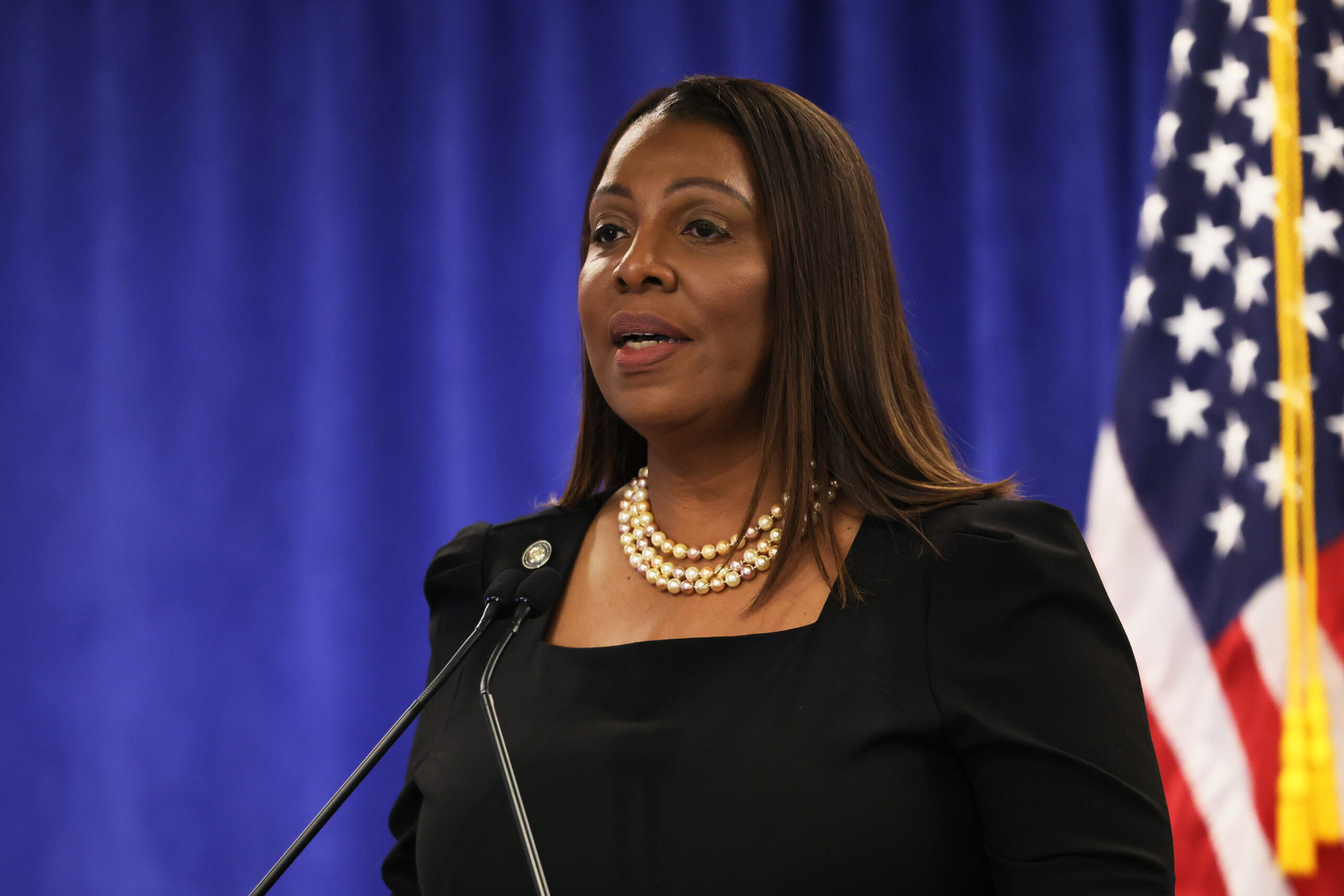The possibility that Judge Juan Merchan will drop, because of presidential immunity, President Trump’s 34 felony convictions throws into sharp relief the increasingly precarious condition of the state cases — civil and criminal — against the former and future president in the wake of his electoral triumph.
Trump’s win could also set the stage for a new chapter of legal clashes as state judges and prosecutors determine whether to retreat or press on in the face of the 45th president’s turn as the 47th. New York’s attorney general, Letitia James, vowed on Wednesday to “use the rule of law to fight back,” and declared: “I am not fearful of Donald Trump.”
Could she be auditioning for a role at the van of Resistance 2.0?
Judge Merchan, who has had a contentious relationship with the 45th president during the pendency of the hush money trial, is set to sentence Trump on November 26. He also has a self-imposed deadline of November 12, set well before the election, to determine if the Supreme Court’s ruling that official presidential acts are presumptively immune affects Trump’s hush money convictions.
Those rulings were meant to be handed down months ago, but Judge Merchan delayed them until after the election. Now, CNN reports that Trump’s lawyers will argue that their client is owed the “same constitutional protections as a sitting president and should be protected from state actors and in this case, state prosecutors.”
The Supreme Court’s immunity decision, in Trump v. United States, covers only the official actions of sitting presidents, not presidents-elect. Judge Merchan, though, could reckon that imposing a prison sentence for the falsification of business records detailing payments to the adult film star known as Stormy Daniels would be unwise. That is because Trump would only conceivably begin his time behind bars after Inauguration Day. The Supreme Court could step in to ensure that does not happen.
Once Trump takes the oath of office, he will become swaddled in even more robust protections than he now enjoys as a former chief executive. Department of Justice regulations prohibit taking any criminal action against a sitting president. That mandate does not cover state prosecutions, but the Supreme Court could intervene to determine that a state prosecution of a president violates the Constitution’s Supremacy Clause, which gives supremacy to federal law when it conflicts with state action.

More straightforward is the fate of Special Counsel Jack Smith, who is prosecuting the two federal cases against Trump. Once Trump takes the oath, he will wield the power to appoint an attorney general to fire Mr. Smith. Trump will also hold the pardon power. Those twin grants are likely behind reports that the DOJ is exploring how to wind down the January 6 and Mar-a-Lago cases before January 20. NBC News reports that Attorney General Garland sees “no point in continuing to litigate them.”
The protections from prosecution that presidents are afforded in criminal cases does not extend to civil ones, like the $450 million fraud verdict against Trump secured by Ms. James. Judge Arthur Engoron, whom the president called “a Trump-hating judge,” determined that Trump, his family, and his organization engaged in “persistent fraud” by overvaluing their properties. He also appointed an independent monitor to chaperon the enterprise. Judge Engoron imposed a gag order on Trump.
New York’s review court, the First Department of the Appellate Division, expressed skepticism about that verdict, suggesting that it could be overruled in part or in whole. One justice ventured that the “immense penalty in this case is troubling.” The Supreme Court ruled on the matter in Clinton v. Jones.
That is the case in which an Arkansas state employee, Paula Jones, alleged that President Clinton, while he was the governor, made “ahorrent” sexual advances on her at the Excelsior Hotel at Little Rock. The court held held that sitting presidents possess no immunity for acts done before taking office and unrelated to their official duties.
That means that Ms. James’s case does not have to freeze in place for four years. The attorney general, who could be contemplating a bid for mayor of New York, appears unbowed by Trump’s imminent investiture as president, an outcome she allowed that she “did not expect” but to which she is “prepared to respond.”
In October the district attorney of Fulton County, Fani Willis, who is prosecuting Trump for election interference in Georgia, vowed that she would “continue to prosecute every single case in my office.” In March she declared in respect of her racketeering case that “there are efforts to slow down this train, but the train is coming.”
More recently, Ms. Willis’s racketeering case against a rapper, Young Thug — the longest trial in Peach State history — ended largely in defeat for Ms. Willis, with the primary defendant pleading guilty and being sentenced to time served. He was released from the Cobb County jail last week.
Also coming is a December 5 date for oral arguments at the Georgia Court of Appeals to determine whether Ms. Willis ought to be disqualified from the sprawling case against Trump and 18 others on account of her secret affair with her handpicked special prosecutor, Nathan Wade.
The losing side in the case is expected to appeal, which will further delay the case for months. Even if Ms. Willis manages to stay on the case, the Supreme Court could freeze the prosecution until the end of Trump’s term — 2029.
(Except for the headline, this story has not been edited by PostX News and is published from a syndicated feed.)

